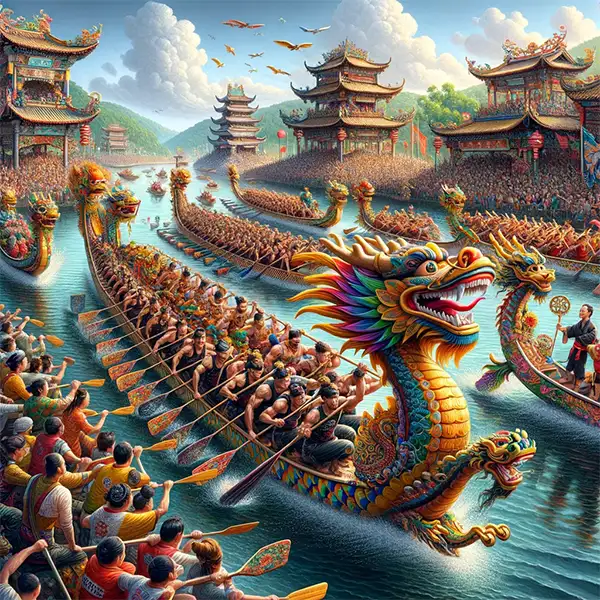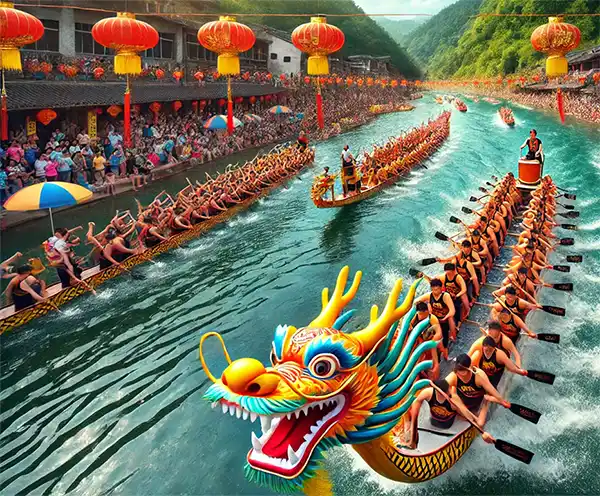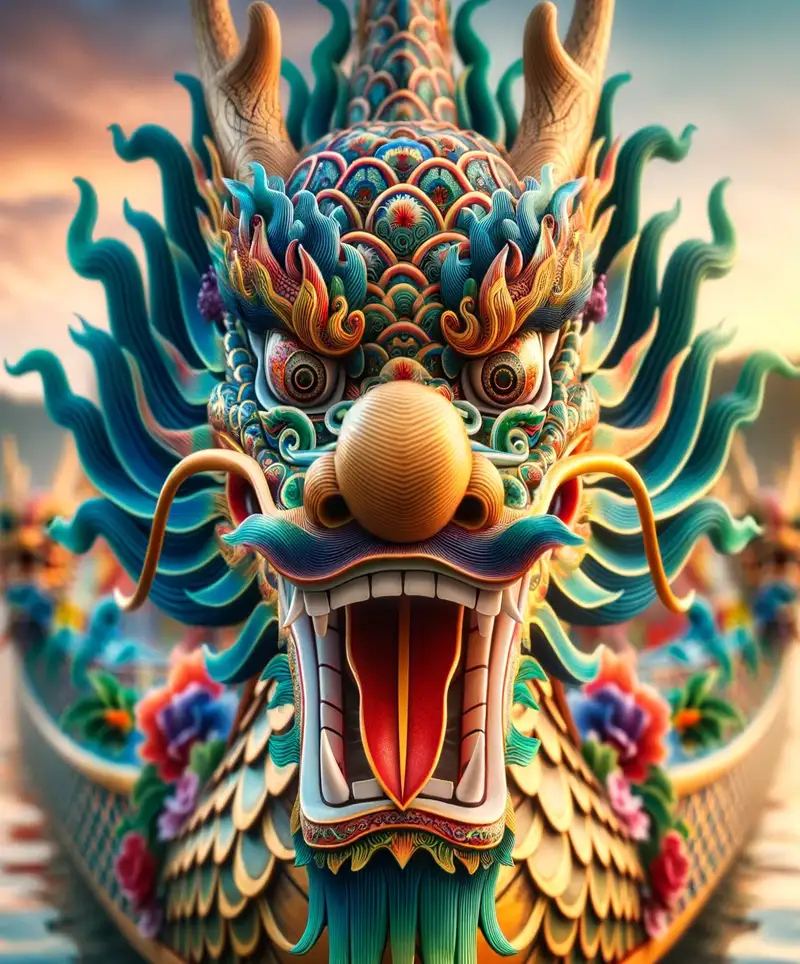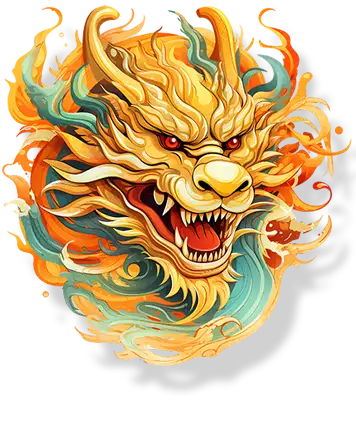Racing Through Tradition
The Dragon Boat Festival, also known as the Duanwu Festival, is an annual celebration steeped in history, tradition, and a fair amount of friendly competition. Originating in China over 2,000 years ago, this vibrant event has transcended borders, captivating people worldwide with its thrilling boat races, intricate rituals, and, of course, delicious zongzi. Let’s dive into the watery world of dragon boats and their crews, where paddles fly and friendship shines.
 A Brief History of the Dragon Boat Festival
A Brief History of the Dragon Boat Festival
The origins of the Dragon Boat Festival are as colorful as the boats themselves. The most popular legend involves Qu Yuan, a patriotic poet and statesman who lived during China’s Warring States period. Qu Yuan was deeply admired for his loyalty and wisdom, but political intrigue led to his exile. Upon learning of his kingdom’s defeat, Qu Yuan reportedly threw himself into the Miluo River in despair. Villagers, moved by his devotion, raced out in boats to save him, beating drums and throwing rice into the water to ward off evil spirits and prevent fish from eating his body. Over time, these actions evolved into the dragon boat races and the custom of eating zongzi, sticky rice wrapped in bamboo leaves. Other legends and regional interpretations also enrich the festival’s meaning, highlighting themes of heroism, sacrifice, and unity.
Dragon boats are long, narrow vessels adorned with ornate dragon heads and tails. These majestic beasts can range from a modest 12 meters to an impressive 30 meters in length, depending on the tradition and the number of paddlers they carry. Their intricate designs often include bold colors and detailed carvings, symbolizing strength, courage, and protection. The dragon motif is central, as dragons in Chinese culture are revered as powerful, benevolent creatures that bring good fortune and ward off evil spirits. While undeniably beautiful, these boats are meticulously engineered for speed, with streamlined shapes that slice through the water. Constructing and decorating a dragon boat is an art form in itself, often involving skilled artisans who honor centuries-old techniques and symbolism.
A Symphony of Teamwork
A dragon boat crew typically consists of 20 paddlers, a drummer, and a steersperson, though variations exist based on the size of the boat. Each role is crucial to the team’s success:
- Paddlers: The heart and muscle of the team, paddlers work in perfect harmony to propel the boat forward. Sitting in pairs, they must synchronize their strokes precisely to maximize speed and efficiency. Training for paddlers involves not only physical conditioning but also the development of a strong mental connection with their teammates, as even a slight mismatch in timing can disrupt the boat’s momentum.
- Drummer: Perched at the front, the drummer sets the pace, pounding out a rhythm that keeps the paddlers in sync. Think of them as the orchestra conductor—except with a drum and a penchant for dramatic flair. The drummer’s role extends beyond keeping time; they also act as the team’s motivator, using chants and beats to inspire energy and determination during intense races.
- Steersperson: Positioned at the rear, the steersperson ensures the boat stays on course. With a single oar, they navigate the tight turns and keep the dragon from veering into chaos. Their role demands precision, quick decision-making, and an unshakable focus, especially during close races or tricky maneuvers. A skilled steersperson is often the unsung hero of a successful dragon boat crew.
Where Tradition Meets Adrenaline
Dragon boat racing is not for the faint of heart. As the starting horn sounds, teams launch into a frenzied yet synchronized paddle-off. The intensity is palpable as paddles churn the water, creating sprays of foam and waves of excitement. Spectators cheer from the shoreline, creating an electrifying atmosphere that’s part sports event, part cultural celebration. The sight of colorful boats cutting through the water, accompanied by the rhythmic pounding of drums, is nothing short of mesmerizing. Competitions range from local festivals to international championships, attracting amateur enthusiasts and professional athletes alike. Races often take place on rivers, lakes, or coastal waters, with courses varying in length to test speed, stamina, and strategy.
 The Festival’s Delicious Highlight
The Festival’s Delicious Highlight
No Dragon Boat Festival is complete without zongzi. These pyramid-shaped bundles of sticky rice are stuffed with various fillings, from savory pork and mushrooms to sweet red bean paste. Wrapped in bamboo leaves and steamed to perfection, zongzi are as much a culinary delight as they are a tribute to the festival’s origins. Preparing zongzi is a labor of love, often involving family and friends coming together to wrap and cook the rice dumplings. Each region in China has its unique take on zongzi, with different fillings and cooking methods. For example, southern regions favor savory flavors, while northern areas lean toward sweet variations. Beyond their taste, zongzi carry deep symbolic meaning, representing respect for tradition, gratitude, and community.
While the Dragon Boat Festival began in China, its appeal has spread far and wide. Today, dragon boat races are held in countries as diverse as Canada, Australia, and Singapore. Each locale adds its unique twist to the celebration, but the core elements—teamwork, tradition, and tasty treats—remain the same. In North America, dragon boat festivals often serve as fundraisers for charitable causes, combining the spirit of competition with a sense of giving back. Meanwhile, in Southeast Asia, the races are part of larger cultural festivals featuring parades, music, and traditional performances. The global embrace of dragon boat racing highlights its universal appeal, transcending language and borders to unite people in a shared celebration of heritage and sport.
The Lighter Side of Dragon Boating
Dragon boat racing isn’t all intense paddling and fierce competition. It’s also a chance for participants to bond, share a laugh, and maybe even don some outrageous costumes. From paddlers dressed as superheroes to teams with punny names like “Paddle Me Timbers” and “Rowed Warriors,” the festival’s humor and camaraderie are as infectious as its energy. Many teams use the event as an opportunity to connect with their communities, hosting team-building activities, sharing meals, and celebrating their hard-earned victories—or near victories—together. The joy of dragon boating lies not just in winning but in the shared experience, where paddling through waves becomes a metaphor for navigating life’s challenges as a unified team.
The Dragon Boat Festival is a celebration of culture, community, and the indomitable human spirit. Whether you’re paddling your heart out, cheering from the sidelines, or simply savoring a zongzi, this festival offers something for everyone. So, grab your paddle (or your rice dumpling) and dive into the festivities—the dragons are waiting!
Given the sprawling nature of the Dragon Boat Festival, pinpointing the exact date of festivities in every corner of the globe would be like trying to catch a dragon by its tail—entertaining to watch but ultimately futile. Each country, city, and community tends to put its own spin on the celebration, aligning it with local traditions, climates, and calendars. Imagine trying to list every birthday party in the world on the same day; chaos would ensue, with probably a shortage of party hats and dragon boats.
For our purposes, let's anchor ourselves to the original festivities unfolding in China, where the Dragon Boat Festival surges into action on the fifth day of the fifth lunar month. This time-honored tradition lights up the country with dragon boat races, the air filled with the scent of zongzi, and communities getting together in a vibrant demonstration of history, culture, and the indomitable spirit of the dragon. As for keeping track of when each local celebration occurs across the globe, it's a Herculean task best left to the local dragon boat aficionados. Just know that when the drums start beating, and paddles hit the water, a celebration is near, and you're invited to join in the revelry, wherever you may be.
Please Share our Content






 A Brief History of the Dragon Boat Festival
A Brief History of the Dragon Boat Festival The Festival’s Delicious Highlight
The Festival’s Delicious Highlight






 "Sláinte!" is a traditional Irish expression used as a toast, equivalent to "Cheers!" in English.
"Sláinte!" is a traditional Irish expression used as a toast, equivalent to "Cheers!" in English.